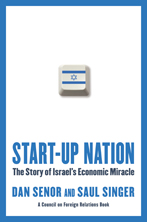
The economy of Israel is a highly developed free-market economy. The prosperity of Israel's advanced economy allows the country to have a sophisticated welfare state, a powerful modern military said to possess a nuclear-weapons capability with a full nuclear triad, modern infrastructure rivaling many Western countries, and a high-technology sector competitively on par with Silicon Valley. It has the second-largest number of startup companies in the world after the United States, and the third-largest number of NASDAQ-listed companies after the U.S. and China. American companies, such as Intel, Microsoft, and Apple, built their first overseas research and development facilities in Israel. More than 400 high-tech multi-national corporations, such as IBM, Google, Hewlett-Packard, Cisco Systems, Facebook and Motorola have opened R&D centers throughout the country.
A startup or start-up is a company or project undertaken by an entrepreneur to seek, develop, and validate a scalable business model. While entrepreneurship includes all new businesses including self-employment and businesses that do not intend to go public, startups are new businesses that intend to grow large beyond the solo-founder. During the beginning, startups face high uncertainty and have high rates of failure, but a minority of them do go on to become successful and influential.
Science and technology in Israel is one of the country's most developed sectors. Israel spent 4.3% of its gross domestic product (GDP) on civil research and development in 2015, the highest ratio in the world. In 2019, Israel was ranked the world's fifth most innovative country by the Bloomberg Innovation Index. It ranks thirteenth in the world for scientific output as measured by the number of scientific publications per million citizens. In 2014, Israel's share of scientific articles published worldwide (0.9%) was nine times higher than its share of the global population (0.1%).

Daniel Samuel Senor is an American Canadian columnist, writer, and political adviser. He was chief spokesman for the Coalition Provisional Authority in Iraq and senior foreign policy adviser to U.S. presidential candidate Mitt Romney during the 2012 election campaign. A frequent news commentator and contributor to The Wall Street Journal, he is co-author of the book Start-up Nation: The Story of Israel's Economic Miracle (2009) and The Genius of Israel: The Surprising Resilience of a Divided Nation in a Turbulent World (2023). He is married to television news personality Campbell Brown.

Yokneam Illit, also Yoqne'am Illit and Jokneam Illit, is a city in northern Israel. It is located in a hilly region of the lower Galilee at the base of the Carmel Mountains, and overlooks the Jezreel Valley. It is 21 kilometres from Haifa and 80 kilometres (50 mi) from Tel Aviv. Yokneam is known as Israel's "Startup Village," because its high-tech hub is surrounded by forest and small communities.
A business incubator is an organization that helps startup companies and individual entrepreneurs to develop their businesses by providing a fullscale range of services, starting with management training and office space, and ending with venture capital financing. The National Business Incubation Association (NBIA) defines business incubators as a catalyst tool for either regional or national economic development. NBIA categorizes its members' incubators by the following five incubator types: academic institutions; non-profit development corporations; for-profit property development ventures; venture capital firms, and a combination of the above.

Joseph "Yossi" Vardi is an Israeli entrepreneur and investor. He is one of Israel's first high-tech entrepreneurs, one of the pioneers of the Israeli internet industry. For over 47 years, he has founded and helped to build over 85 high-tech companies in a variety of fields, among them software, energy, Internet, mobile, electro-optics and water technology.

Silicon Wadi is a region in Israel that serves as one of the global centres for advanced technology. It spans the Israeli coastal plain, and is cited as among the reasons why the country has become known as the world's "start-up nation". The highest concentrations of high-tech industry in the region can be found around Tel Aviv, including small clusters around the cities of Raʽanana, Petah Tikva, Herzliya, Netanya, Rehovot, and Ness Ziona. Additional clusters of high-tech industry can be found in Haifa and Caesarea. More recent high-tech establishments have been raised in cities such as Jerusalem and Beersheba, in towns such as Yokneam Illit, and in Airport City.
Venture capital in Israel refers to the financial capital provided to early-stage, high-potential, high risk, growth startup companies based in Israel. The country's venture capital industry was born in the mid-1980s and has rapidly developed since. Israel currently has more than 276 active venture capital funds, of which 71 are international VCs with Israeli offices. Israel's venture capital and incubator industry plays an important role in the booming high-tech sector that has been given the nickname "Silicon Wadi", considered second in importance only to its Californian counterpart, the Silicon Valley.

Saul Singer is formerly the editorial page editor at The Jerusalem Post, Singer co-wrote with Dan Senor Start-up Nation: The Story of Israel's Economic Miracle, a best-seller which investigates Israel's innovative prowess.

Andrey Kolodyuk is a Ukrainian entrepreneur and an investor. The founder of the Aventures Capital Venture Fund and OTT service Divan.tv.

“BillGuard” was a personal finance security and productivity company. Its mobile and website application scans credit card and debit card transactions, alerting users to possible scams, billing errors, fraudulent charges and hidden fees.

Craig Gotsman is a Distinguished Professor of Computer Science at the New Jersey Institute of Technology (NJIT). He was the Dean of the Ying Wu College of Computing at NJIT between 2017-2023. He was the Founding Director of the joint Jacobs Technion-Cornell Innovation Institute at Cornell Tech prior to joining NJIT.

Jonathan Medved is a serial entrepreneur, venture capitalist and angel investor in Israel's high-tech scene. He is the founder and CEO of OurCrowd, a leading equity crowdfunding platform. Medved was named one of the "50 Most Influential Jews" by the Jerusalem Post, where he was dubbed "the startup nation's guru."
Raphael Ouzan is an Israeli technologist and entrepreneur. The recipient of Israel's President's Award for Technology and Innovation, he is the co-founder of BillGuard and the founder and chairman of Israel Tech Challenge.
The Bundesverband Deutsche Startups is a membership corporation based in Berlin and an association of the German startup industry. It was founded in 2012 to represent and function as a voice of startups vis-à-vis politics, civil society and the established economy. The association is committed to a founder-friendly Germany, promotes innovative entrepreneurship and wants to carry the startup mentality into society. As a network, the Federal Association of German Startups connects founders, startups and their networks.
Yadin B. Kaufmann is an Israeli-American technology investor, social entrepreneur and writer.
Yossi Dashti (born in 1952) is an Israeli-American author, researcher, and business facilitator, in the field of computer information systems, innovation and entrepreneurship. In his books and publications, he promotes value creation and process improvements, while integrating academic research and practical technology innovation business experience. In his early career, Dr. Dashti was engaged with Information Technology (IT) and software applications and was among the pioneers in the development of Electronic Data Interchange (EDI) and E-Commerce platforms.

Michael Eisenberg is an American-born Israeli businessman, venture capitalist, and author.

CIIE.CO is an Indian startup accelerator and incubator that supports early-stage startups located at IIM Ahmedabad in Ahmedabad, India. It was founded in 2002 to promote innovation and entrepreneurship in India. It is a Center of excellence set up at Indian Institute of Management Ahmedabad with support from the Government of India's Department of Science and Technology and the Government of Gujarat.












